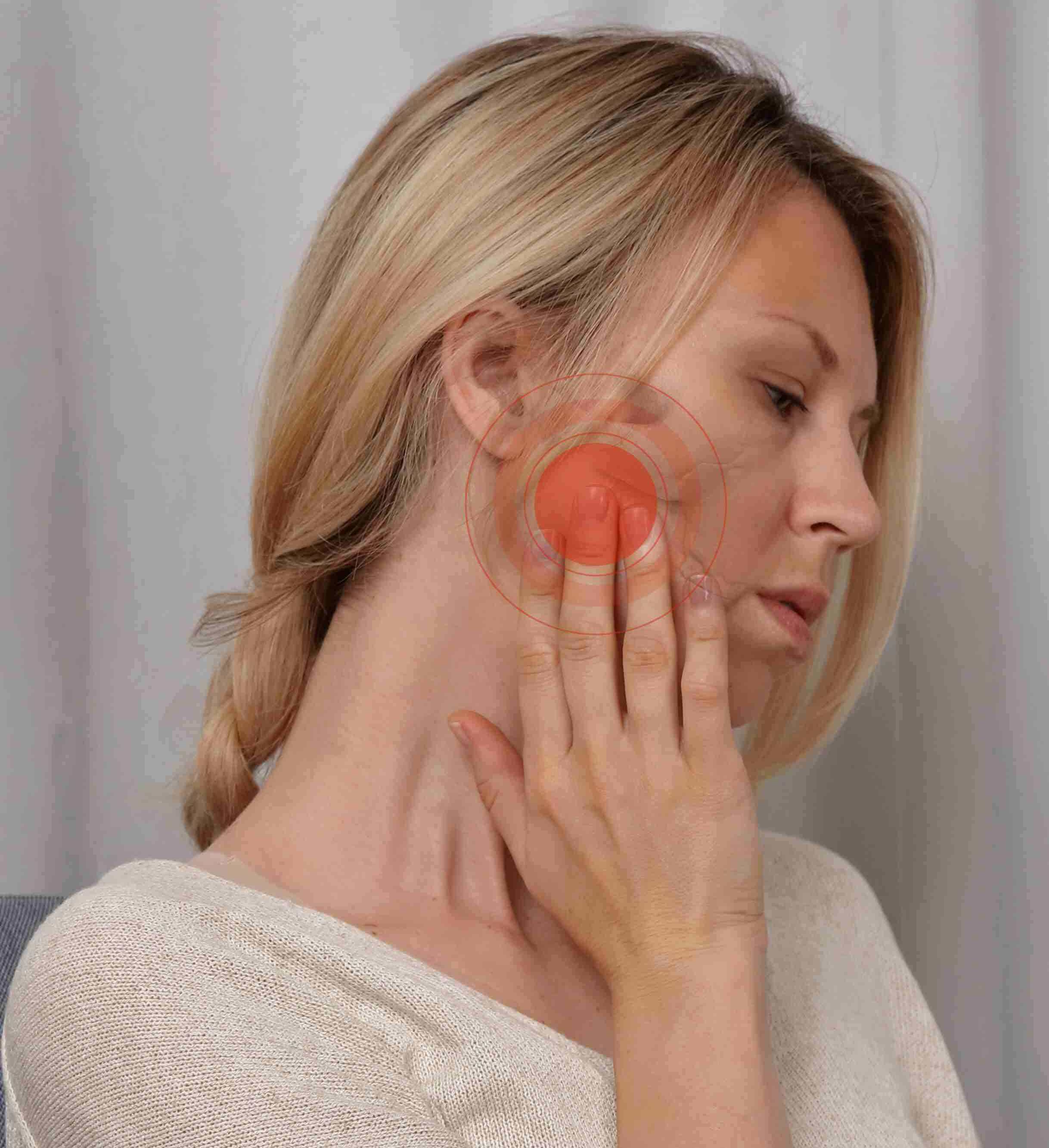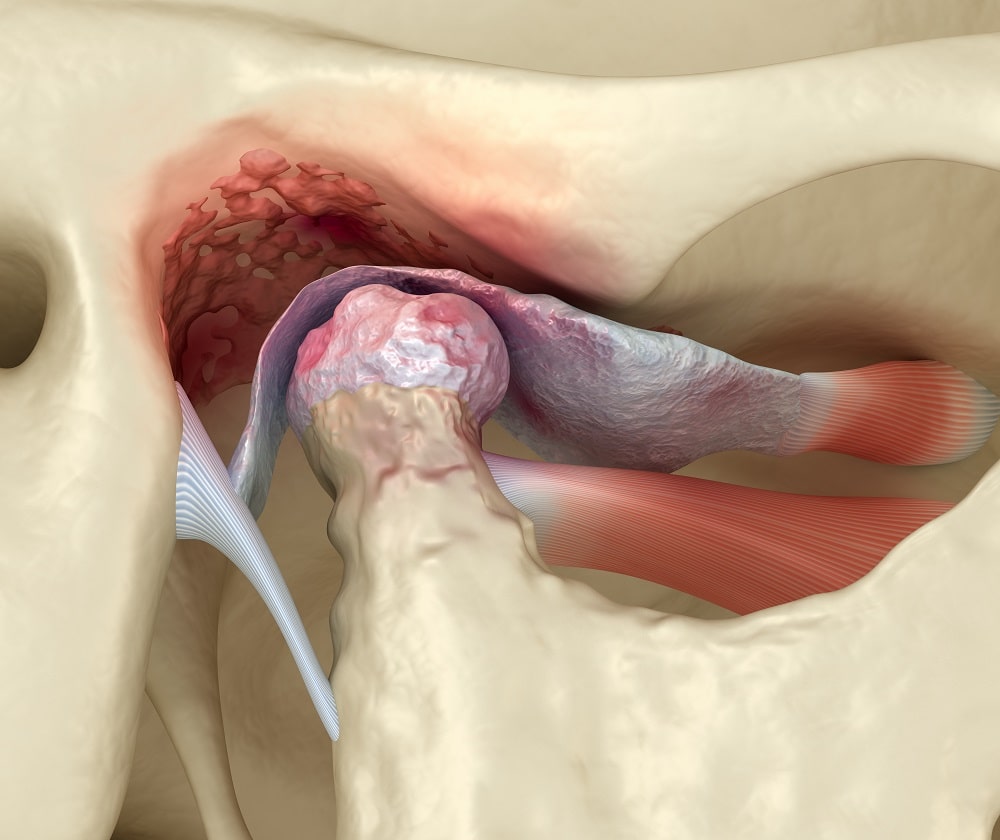
About one in ten people in the UK have a problem with their jaw joint. This group of conditions are known as temporomandibular joint (TMJ) disorder or jaw joint dysfunction. These conditions can affect how well the jaw joint works and can cause pain.
More women develop jaw conditions than men. Jaw problems can occur at any age, but most people experience these issues between 20 to 40 years of age.
The jaw joint allows the jaw bone to move forward and backwards, from side to side, and close and open the mouth. It is a complicated joint with several ligaments and muscles that allow different movements. Its complication makes it easy to have several problems.
The symptoms of TMJ include:
Some people do not experience pain when they have jaw joint problems, only clicking and difficulty opening the mouth. If you experience pain, it will worsen over time. The symptoms may worsen when chewing or if you feel stressed.
You can manage the symptoms at home, but they usually get better without treatment within a few months. However, if you are worried about the pain or other symptoms, visit your dentist to know if treatment may help.

If you have problems with your jaw or experience discomfort, visit your dentist. The dentist will examine your mouth, ask if you experience symptoms, and ask about your medical history. Your dentist will also examine your neck, face, jaw and head, checking for tenderness.
They may ask you to move your jaw in different directions to help see how you move your jaw and if you experience pain or make clicking noises when moving your jaw. The dentist will also examine your mouth to check for problems with your gums or teeth.
Your dentist will ask if you have any triggers for the jaw problem, like yawning or chewing. They will check if you bite your nails or grind your teeth, which can cause jaw problems.
The jaw joint is complicated, so several factors can cause jaw problems. This often makes diagnosing the exact cause of the symptoms. The dentist will make a diagnosis after examining you.
They may also refer you to an oral and maxillofacial surgeon. One or more of the following tests may be necessary.
Jaw joint problems usually get better within 3 – 6 months and do not cause complications. Resting your jaw joint can help relieve your symptoms. The following may also help.
If treatment is necessary, the type of treatment depends on the exact cause of the jaw joint problem. Over-the-counter pain medications like ibuprofen or paracetamol can help ease the pain.
If your dentist suspects you grind your teeth or clench your jaw when sleeping, they may recommend wearing a bite splint (bite guard). It is a plastic cover that fits over the lower or upper teeth and prevents them from making contact.
Most jaw joint problems do not last long and won’t worsen. However, if your condition doesn’t improve within three months, your dentist may recommend visiting an oral and maxillofacial surgeon.
In a very small number of cases, the specialist may recommend surgery if you experience severe pain and your jaw joint is causing significant problems. Few people have surgery, as surgery is only an option if other treatments haven’t worked.
Sometimes, the surgeon may try to manipulate the jaw joint under general anaesthetic to see if that can correct them, administer a lubricant to the joint area or administer an injection to relax the muscles controlling your jaw. Surgery to treat jaw problems may involve opening the jaw joint and operating on the ligaments, cartilage and bones. Another option is replacing the jaw joint with an artificial joint. Discuss the jaw surgery’s benefits and risks with your surgeon to determine the right option.

The exact cause of jaw joint problems is still not fully understood, as there are several causes. Many people have several causes at once.
Injury to the jaw during a more complex dental procedure like removing wisdom teeth, overstretching when yawning or knocking your chin can trigger jaw joint problems. Teeth grinding (bruxism) and jaw clenching may also trigger jaw joint problems.
Disc displacement means the articular disc is in the wrong position. The articular disc is a thin disc inside the jaw joint. The displacement can occur if you injure or dislocate your jaw. You may hear notice when moving your jaw, like a grating, popping or clicking.
If you experience prolonged symptoms of jaw joint problems, consult your dentist or visit Kingston Orthodontics. You can also call us on 0203 002 2501 to book an appointment or for more information on our TMJ dysfunction treatments.

Spread the cost of any treatment
We are here to help you achieve the perfect – and affordable – smile so please talk to us about our popular interest-free payment plans. Spread the cost and relax – secure in the knowledge that your treatment will take place on time and on budget.